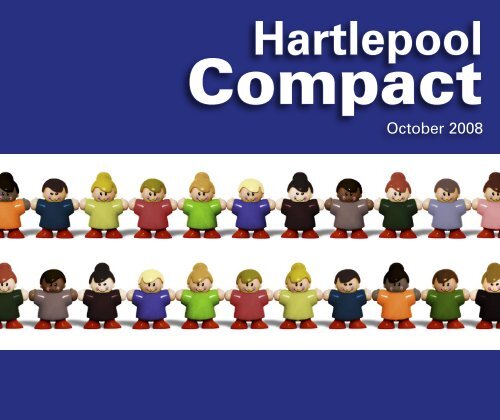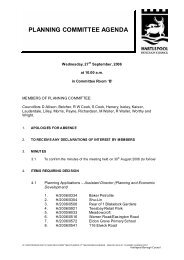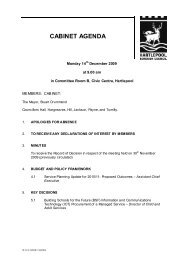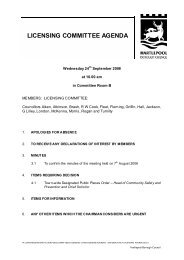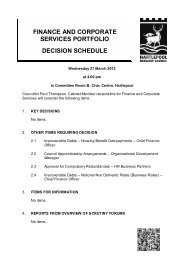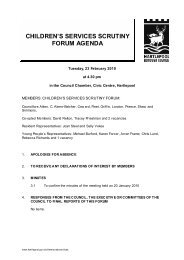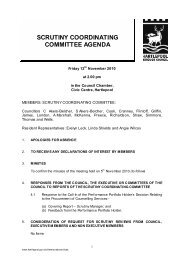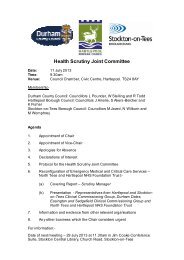Compact Final .indd - Hartlepool Borough Council
Compact Final .indd - Hartlepool Borough Council
Compact Final .indd - Hartlepool Borough Council
Create successful ePaper yourself
Turn your PDF publications into a flip-book with our unique Google optimized e-Paper software.
<strong>Hartlepool</strong><br />
<strong>Compact</strong><br />
October 2008<br />
1
Foreword<br />
In <strong>Hartlepool</strong> there is a strong tradition of the public, private and community and<br />
voluntary sectors working in partnership to improve the environment and economic<br />
and social well-being of the <strong>Borough</strong>.<br />
This <strong>Compact</strong> sets out the agreed working practices between the voluntary,<br />
community and named public sector service providers and recognises the value of<br />
services provided by voluntary and community groups in <strong>Hartlepool</strong>.<br />
This <strong>Compact</strong> aims to make a difference to our community by helping to deliver,<br />
directly and in partnership with others, high quality services which will improve the<br />
quality of life of our residents.<br />
Mayor Stuart Drummond<br />
Chair of the <strong>Hartlepool</strong> Partnership<br />
<strong>Hartlepool</strong> <strong>Compact</strong><br />
2
Vision<br />
The <strong>Hartlepool</strong> <strong>Compact</strong> aims<br />
to strengthen the relationship<br />
between the public sector and<br />
the voluntary and community<br />
sector, working towards<br />
shared objectives to improve<br />
the quality of people’s<br />
lives within <strong>Hartlepool</strong>.<br />
3
1. Purpose of the <strong>Compact</strong><br />
The <strong>Compact</strong> is an agreement between <strong>Hartlepool</strong><br />
<strong>Borough</strong> <strong>Council</strong>, local service providers and<br />
commissioners of services and the voluntary and<br />
community sector.<br />
The purpose of the <strong>Compact</strong> is to set out codes of<br />
practice and terms of engagement that organisations<br />
will agree to work to and more importantly sign up to.<br />
This will ensure that all partners are aware of and can<br />
be responsible for the level of engagement expected<br />
from them and what they expect from others when<br />
working in partnership. This mutual agreement between<br />
partners will improve their relationships and benefit the<br />
communities within <strong>Hartlepool</strong>.<br />
Purpose of the <strong>Compact</strong><br />
4
2. Background<br />
The Voluntary and Community Sector (VCS) is a key<br />
partner in the design and delivery of services that<br />
communities want.<br />
In recognition of this, in 1998 a national compact was<br />
launched which set out an agreement between the<br />
Government and the VCS to improve their relationships<br />
for mutual advantage.<br />
Such an approach was also encouraged at regional and<br />
local levels.<br />
Early in 2003 a framework was developed that set out<br />
the shared values, principles and operational guidelines<br />
between <strong>Hartlepool</strong> <strong>Borough</strong> <strong>Council</strong>, community<br />
groups and voluntary organisations in <strong>Hartlepool</strong>. This<br />
was the <strong>Borough</strong>’s first local <strong>Compact</strong> and it included a<br />
commitment to extend the approach to encompass other<br />
agencies’ relationships with the <strong>Hartlepool</strong> community<br />
and voluntary sector.<br />
One of the recommendations of the <strong>Borough</strong> <strong>Council</strong>’s<br />
Strengthening Communities Best Value Review<br />
in 2006 was that the local <strong>Compact</strong> needed to be<br />
strengthened and re-launched. <strong>Hartlepool</strong> Partnership<br />
(the Local Strategic Partnership 1 (LSP)) considered these<br />
recommendations in February 2007. In addition, in line<br />
with the commitment in the first local <strong>Compact</strong>, and<br />
following the Regional <strong>Compact</strong>, which encompasses the<br />
whole of the public sector, this second local <strong>Compact</strong> has<br />
been developed to include other named partners, and<br />
therefore builds on the first <strong>Compact</strong>.<br />
A full list of all the public sector partners is included in<br />
Appendix 1. A mechanism for identifying and signing up<br />
VCS partners is currently being worked up.<br />
In 2006 a regional compact was developed aiming to<br />
improve partnership working and relationships between<br />
regional organisations within the VCS and the public<br />
sector in the North East. It provides a basic framework<br />
setting out the main principles and commitments that<br />
these relationships can be built upon.<br />
1<br />
The <strong>Hartlepool</strong> Partnership is the <strong>Borough</strong>’s Local Strategic Partnership (LSP). Working through a Board and a set of Theme Partnerships; it brings together a<br />
range of local organisations to give the <strong>Borough</strong> a strong, united voice.<br />
Background5
3. Status of the <strong>Compact</strong><br />
This local <strong>Compact</strong> has been drawn up in partnership<br />
following consultation with the VCS, key public sector<br />
bodies and local organisations. It is a written agreement<br />
containing a series of codes designed to improve<br />
relationships between the VCS and other organisations<br />
in <strong>Hartlepool</strong> (and sets out guidelines on meaningful<br />
consultation with various sectors of the community).<br />
It is not a:<br />
• Service level agreement;<br />
• Contract;<br />
• Legally binding document;<br />
• Funding guarantee;<br />
• Replacement for existing partnership<br />
agreements.<br />
It is hoped that the <strong>Compact</strong> will bring real change in<br />
culture and produce significant benefits to local<br />
communities by helping public agencies and local<br />
organisations, both voluntary and statutory, to work more<br />
effectively to provide better services.<br />
Status Of The <strong>Compact</strong><br />
6
4. Implementation and Review<br />
There is need for an ongoing process of review to ensure<br />
effective implementation of the <strong>Hartlepool</strong> <strong>Compact</strong>,<br />
ensuring that it is made to work in practice.<br />
The following arrangements have been made to keep its<br />
operation under review:<br />
It is proposed that the monitoring will be undertaken by<br />
the Community Network 2 , discussed quarterly at their<br />
meetings. The <strong>Compact</strong> will be an open agenda item<br />
that people can attend the meetings to discuss. This<br />
arrangement will be kept under review to ensure that it is<br />
the most efficient way to monitor the <strong>Compact</strong>.<br />
It is also proposed that the annual action plan needs to<br />
be tied into <strong>Hartlepool</strong>’s Local Area Agreement 3 Annual<br />
Performance Framework and it should be monitored<br />
through the <strong>Hartlepool</strong> Partnership / Community<br />
Network.<br />
The Community Network has agreed to review case<br />
studies of disputes that may occur and feed them into the<br />
ongoing development of the <strong>Compact</strong> through the Action<br />
Plan. Appendix 3 shows a diagram which should be<br />
followed if disputes occur.<br />
2<br />
<strong>Hartlepool</strong> Community Network is the town’s Community Empowerment Network and is the means by which the community is brought together to influence the<br />
work of the <strong>Hartlepool</strong> Partnership. The aim is to bring the views of the VCS into the development of the decision making process and to encourage wider<br />
resident participation in neighbourhood renewal.<br />
Implementation & Review<br />
7
<strong>Compact</strong> Advocacy<br />
The <strong>Compact</strong> Advocacy Programme is run by the<br />
voluntary and community sector, for the sector. It is<br />
based at the National <strong>Council</strong> for Voluntary Organisations<br />
(NCVO). Since 2002 it has been working towards<br />
ensuring compliance with <strong>Compact</strong> principles. This<br />
has been done at a national level through advocacy,<br />
campaigning and lobbying government departments on<br />
behalf of the voluntary and community sector.<br />
The <strong>Compact</strong> Advocacy Programme also works at a local<br />
level. It is recognised that there is little awareness of the<br />
<strong>Compact</strong> at a local level and there are still many instances<br />
of non-compliance. The <strong>Compact</strong> Advocacy Programme<br />
will work on behalf of the voluntary and community<br />
sector working closely with organisations where the<br />
<strong>Compact</strong> and the associated codes have been breached.<br />
They do this by making a campaign plan to make<br />
representations on behalf of the organisation to relevant<br />
government or local departments, through lobbying,<br />
advocacy, wider campaigning and negotiation.<br />
<strong>Compact</strong> Advocacy<br />
8
5. The <strong>Hartlepool</strong> <strong>Compact</strong> Codes<br />
The <strong>Hartlepool</strong> <strong>Compact</strong> puts forward a series of Codes<br />
which provide the ground rules for good practice. The<br />
Codes are for all parties to strive to achieve. They cover<br />
the following areas:<br />
a. Funding Code;<br />
b. Consultation and Policy Code;<br />
c. Inclusion Code (Minority and Small Community Groups Code);<br />
d. Code of Practice on Representation;<br />
e. Volunteering Code.<br />
<strong>Compact</strong> Codes<br />
9
a) Funding Code<br />
i) All partners will adopt processes that are nondiscriminatory<br />
to small voluntary and community<br />
groups.<br />
ii)<br />
iii)<br />
iv)<br />
All partners will recognise the importance of<br />
funding core costs (whilst acknowledging the trend<br />
of funders moving away from funding core costs to<br />
encouraging VCS groups to apply for funding on the<br />
basis of full cost recovery rates), repeat funding and<br />
inflation rises.<br />
All partners will recognise the benefits of offering<br />
multi-year and roll forward funding, preferably on a<br />
3 year basis where possible, to allow for long-term<br />
planning.<br />
All partners will give early notification on<br />
agreements for future years funding and if this is<br />
not possible identify contingencies e.g. extend<br />
existing contracts by a couple of months until<br />
decisions are made.<br />
v) All partners will adopt an open, transparent and<br />
timely (clearly set out) funding process and ensure<br />
that voluntary, community and local organisations<br />
realise the principles of accountability and<br />
transparency in all areas of their activities.<br />
vi)<br />
All partners will adopt an open, transparent and<br />
timely (clearly set out) tendering process ensuring<br />
that the same processes / time scales / information<br />
will apply to all VCS groups and organisations.<br />
vii)<br />
viii)<br />
ix)<br />
All partners will adopt the practice of written<br />
agreements which set out the objectives of funding,<br />
the payment arrangements and the monitoring<br />
requirements.<br />
All partners will seek to allocate resources against<br />
clear and consistent criteria, including value for<br />
money.<br />
All partners will seek to maintain high standards of<br />
governance and conduct and meet reporting and<br />
accountability obligations to funders and users.<br />
x) All partners will respect and be accountable to<br />
the law and in the case of charities, observe the<br />
appropriate guidance from the Charity Commission.<br />
xi)<br />
xii)<br />
xiii)<br />
All partners will seek to assist local groups to<br />
be able to compete for work which is being<br />
commissioned or contracted, where appropriate.<br />
Work that is to be commissioned or contracted<br />
shall be promoted so that appropriate VCS groups<br />
are also able to bid using the same processes<br />
as that for inviting other potential tenders for<br />
such work (including using the same notification<br />
processes and time scale).<br />
All partners will seek to ensure that funding will be<br />
paid on time and where possible make payments in<br />
advance to ‘kick start’ projects.<br />
All partners will adopt the practice of providing<br />
detailed application guidance for voluntary,<br />
community and local organisations, including<br />
examples where possible, clarifying the information<br />
required and detailing eligible costs.<br />
Funding Code<br />
10
Best Practice Example - Community Pool<br />
2007/2008 - <strong>Hartlepool</strong> Citizens Advice<br />
Bureau<br />
<strong>Hartlepool</strong> <strong>Borough</strong> <strong>Council</strong>’s Community Pool<br />
provides financial assistance to support those aspects<br />
of the activities of the voluntary / community / not for<br />
profit sector that clearly reflect the aspirations of the<br />
<strong>Council</strong>’s Community Strategy. The main objective of<br />
the Community Pool is to support the strategies aim<br />
of “strengthening communities”. Grant aid from the<br />
Community Pool is provided as a contribution towards<br />
the core costs of an organisation.<br />
<strong>Hartlepool</strong> Citizens Advice Bureau is a free, confidential<br />
and independent advice, information and advocacy<br />
service for the local community.<br />
In 2007/2008 <strong>Hartlepool</strong> Citizens Advice Bureau was<br />
awarded a grant of £74,801 from the Community Pool as<br />
a contribution towards the groups core costs, including<br />
the salary costs of key members of staff.<br />
Core funding from the Community Pool enabled<br />
<strong>Hartlepool</strong> Citizens Advice Bureau to employ key staff<br />
to manage / supervise the staff who work to deliver the<br />
various services / projects that the CAB provide for the<br />
benefit of local residents including Debt Advice Service,<br />
Community Care Advocacy Service, Legal Help Franchise,<br />
Welfare Benefits Advice Service, Housing Advice and<br />
Tenancy Support Service, Consumer Advice Service.<br />
Community Pool<br />
11
) Consultation and Policy Code<br />
i) All partners will ensure inclusiveness with partners,<br />
and share strategy documents and consultation<br />
exercises.<br />
ii)<br />
iii)<br />
iv)<br />
All our documents will use simple, clear language<br />
and will be available in formats, including different<br />
languages if requested, to meet the needs of<br />
residents.<br />
All partners will build early consultation into plans<br />
for statutory policy and strategy development,<br />
allowing 8 weeks for consultation, where<br />
practicable.<br />
All partners recognise the constraints upon, and<br />
resource implications for voluntary and community<br />
organisations, and will use a variety of consultation<br />
methods (innovative where possible) and levels, in<br />
order to be as inclusive as possible.<br />
v) All partners will make clear the purpose and scope<br />
of each consultation and will provide background<br />
information and contact details for additional<br />
information.<br />
vi)<br />
For each consultation, information will include<br />
details of the time scale, any decisions already<br />
made, arrangements for expressing views and<br />
clarification on what influence those views will<br />
have on any other contributory factors to the final<br />
decision making process.<br />
vii)<br />
viii)<br />
ix)<br />
All partners will ensure there will be clear and<br />
constructive feedback setting out reasons for<br />
decisions made or the adoption of a specific<br />
approach.<br />
To avoid duplication and consultation fatigue, and<br />
to ensure the best use of resources, we will use<br />
existing networks and forums to publicise and<br />
organise consultation as well as ensuring closer<br />
co-ordination between departments of large<br />
organisations and between public sector agencies.<br />
All partners to encourage the use of area based<br />
networks to ensure that information reaches the<br />
smallest / more isolated groups to maximise<br />
resources.<br />
x) All partners will seek to ensure respect and<br />
confidentiality in relation to the privileged<br />
information that may be exchanged, within the<br />
constraints of the law and the proper performance<br />
of public duties.<br />
xi)<br />
All partners will support the 7 visions of the<br />
‘Participation Strategy’ to increase the effective<br />
involvement and participation of children and<br />
young people in shaping the <strong>Borough</strong> wide<br />
services available to them across the statutory<br />
and non-statutory sectors (see Appendix 2 further<br />
details on Participation Strategy).<br />
Consultation & Policy Code<br />
12
Best Practice Example-<br />
<strong>Hartlepool</strong> Young Voices Team<br />
The challenge of the <strong>Hartlepool</strong> Participation Strategy<br />
has been to involve children and young people to<br />
create it themselves. To meet this challenge a team of<br />
young people, <strong>Hartlepool</strong> Young Voices (HYV), have<br />
devised and written the Participation Strategy for the<br />
town. HYV are a group of young people, from a range of<br />
backgrounds, including looked after children, nominated<br />
by members of the <strong>Hartlepool</strong> Participation Network.<br />
They are all linked to and representative of a number of<br />
other groups across the town.<br />
This Vision Statement consists of seven statements that<br />
describe how young people should be involved in every<br />
aspect of an organisation’s operation. It is supported<br />
by a set of standards and training materials, also<br />
devised by the young people, called ‘Branching Out’, to<br />
enable organisations to provide evidence that they are<br />
responding to the seven statements of the Vision.<br />
To begin with they had 25 statements, related to the<br />
‘Every Child Matters’ outcomes, which were all relevant<br />
to both organisations and children and young people.<br />
Once they had decided on the most important ones they<br />
were sent out to various organisations that work with<br />
children and young people for consultation / feedback,<br />
before the final copy of the Vision Statement was agreed.<br />
The activities and exercises the team have devised is<br />
definitely their unique trademark for working together to<br />
deliver the Participation Strategy and getting people to<br />
talk to each other whatever their age.<br />
Young Voices Team<br />
13
c) Inclusion Code<br />
(Minority and Small Community Groups’ Code - known<br />
Nationally as Black and Minority Ethnic Voluntary and<br />
Community Organisations Code)<br />
i) All partners will include in this category other<br />
groups that may experience marginalisation,<br />
isolation, disadvantage, exclusion or<br />
discrimination.<br />
ii)<br />
iii)<br />
iv)<br />
All partners will actively support the development<br />
of voluntary and community groups and related<br />
infrastructure organisations, recognising their<br />
local knowledge, expertise and perspective.<br />
All partners will share policy documents and best<br />
practice, and ensure that diverse community<br />
groups 4 are properly represented in their<br />
preparation.<br />
All partners will ensure that we do not<br />
discriminate against any voluntary or community<br />
group on the basis of faith, race, disability, age or<br />
sexual orientation (lesbian, gay and bisexual)<br />
and gender (transgender), and will respect the<br />
voluntary nature of their work.<br />
v) All partners will work to promote and monitor<br />
vi)<br />
vii)<br />
viii)<br />
ix)<br />
policies and services that eradicate discriminatory<br />
practice, implementing equality and diversity<br />
policies, and setting objectives and targets as<br />
appropriate.<br />
All partners will work with advocates and existing<br />
support mechanisms to maximise contributions.<br />
Named contacts will be identified within the<br />
Voluntary Sector and key organisations to deal<br />
with issues raised by minority groups, and act as<br />
a conduit to access relevant officers and services.<br />
All partners will seek to ensure that staff and<br />
contacts receive training and awareness as to<br />
specific needs and responses to particular sectors<br />
of <strong>Hartlepool</strong>’s diverse community.<br />
All partners will support existing diverse<br />
community groups and will develop others<br />
so that people from diverse communities can<br />
raise concerns.<br />
All partners will encourage involvement and<br />
networking between the VCS, diverse people, and<br />
small community groups thereby increasing skills<br />
and knowledge.<br />
4<br />
Diverse community groups refer to Black and Minority Ethnic groups and other minority groups.<br />
Inclusion Code<br />
14
Best Practice Example - A Diverse<br />
Community<br />
<strong>Hartlepool</strong> is made up of many different and diverse<br />
communities, each of which has a right to have its<br />
voice heard. One way in which this happens is when a<br />
group of individuals come together to form a voluntary<br />
or community group. Within the black, minority ethnic<br />
(BME) community this has involved the development of<br />
the Salaam Centre and groups such as <strong>Hartlepool</strong> Pinoy<br />
(Filipino), <strong>Hartlepool</strong> Asian Association, Muslim Welfare<br />
Association, Bangladeshi Cultural Association, Asian<br />
Ladies Sewing Club and the Association of British Poles.<br />
Work with other communities of interest has included<br />
the development of <strong>Hartlepool</strong> Access Groups’ All<br />
Ability Forum and Hart Gables (a Lesbian, Gay, Bisexual<br />
and Transgender Group (LGBT)). The All Ability Forum<br />
has provided an independent ‘voice’ for people with<br />
disabilities and Hart Gables has recently researched the<br />
views of the LGBT community.<br />
A Diverse Community15
d) Code of Practice on Representation<br />
A Protocol between the <strong>Hartlepool</strong> Partnership and<br />
the <strong>Hartlepool</strong> Community NetworkP was agreed by<br />
the <strong>Hartlepool</strong> Partnership Board on 21 October 2005<br />
(reviewed every 3 years).<br />
A copy of this full Protocol can be found on the <strong>Hartlepool</strong><br />
Partnership Website at www.hartlepoolpartnership.co.uk<br />
and it includes principles for community and voluntary<br />
sector representation on the <strong>Hartlepool</strong> Partnership.<br />
A basic principle of this Protocol is; where there is a<br />
requirement for representation from the VCS,<br />
representatives will be selected or elected through an<br />
open and transparent recruitment process and<br />
representatives will be accountable to the VCS.<br />
The <strong>Compact</strong> adopts this basic principle on representation.<br />
Code of Practice<br />
16
Best Practice Example - Protocol<br />
The <strong>Hartlepool</strong> Partnership and the <strong>Hartlepool</strong> Community<br />
Network have agreed a Protocol that sets out how the<br />
Community and Voluntary Sector will be represented on<br />
the <strong>Hartlepool</strong> Partnership.<br />
The Protocol aims to strengthen working relationships by<br />
setting out:<br />
• Opportunities for Community Network<br />
representatives on the <strong>Hartlepool</strong> Partnership Board<br />
and Theme Partnerships;<br />
• Election processes for Community Network<br />
representatives;<br />
• Roles and Responsibilities of Community Network<br />
representatives;<br />
• How the <strong>Hartlepool</strong> Partnership will carry out<br />
consultation activity;<br />
• How conflict will be managed;<br />
• How progress will be measured.<br />
A spokesman for <strong>Hartlepool</strong> Community Network<br />
commented;<br />
“The Protocol was a real step forward in determining<br />
how members from the VCS could have a real input<br />
to the Partnership’s work. Importantly, the Protocol<br />
set out the support that representatives would<br />
receive alongside their roles and responsibilities”.<br />
A member of the <strong>Hartlepool</strong> Partnership Support Team<br />
explains;<br />
“When the Protocol was first developed in 2005<br />
there was real concern amongst members of the<br />
VCS that they wouldn’t have a voice within the<br />
LSP. The development of the Protocol helped me<br />
understand those concerns and make sure our<br />
Terms of Reference were inclusive”.<br />
Protocol17
e) Volunteering Code<br />
The National <strong>Compact</strong> includes a Volunteering Code<br />
of Good Practice. The Code of Good Practice sets out<br />
principles and undertakings for both Government and<br />
the VCS in England on how to work together to support<br />
and promote volunteering and voluntary action. This<br />
Code includes the principles on volunteering have been<br />
adopted into this local <strong>Compact</strong>.<br />
in and gives advice to about 300 people a year including<br />
around 100 carers. The group has its own charity shop<br />
and furniture collection scheme.<br />
Key Principles<br />
• Volunteering must be the result of a free choice by<br />
the volunteer<br />
• Volunteering must be open to everyone<br />
• Volunteers must receive some benefits to make<br />
their contribution worthwhile<br />
• Volunteers must be publicly recognised<br />
Best Practice Example - Volunteering At<br />
Epilepsy Outlook<br />
A positive volunteering experience requires a properly<br />
structured and supported placement involving induction,<br />
clearly defined roles and lines of accountability. Over the<br />
years <strong>Hartlepool</strong> Voluntary Development Agency (HVDA)<br />
has facilitated this through formal training and one to<br />
one good practice support to groups such as Epilepsy<br />
Outlook.<br />
Epilepsy Outlook is a user led group which operates a drop<br />
The group operates a unique volunteer programme<br />
whereby at any one time half of the 30 or so volunteers<br />
have epilepsy or a specific medical condition,<br />
mental health problem or disability. The programme<br />
provides support and training to all volunteers within<br />
the organisation. Volunteer job roles include advice<br />
workers, trainers, tutors, shop assistants, van drivers,<br />
warehouse workers, furniture repairers, craft makers and<br />
administration workers.<br />
“I feel safe when I work with my friends at Epilepsy<br />
Outlook because everyone knows what to do if I<br />
have a seizure and don’t make me feel different.”<br />
Volunteer<br />
Epilepsy Outlook<br />
Volunteering Code<br />
18
Volunteer Opportunities in <strong>Hartlepool</strong><br />
People who wish to volunteer can contact HVDA, which<br />
provides information, advice and guidance which will<br />
match their skills and interests with available opportunities.<br />
There is a specific service for young people, those aged<br />
under 25. This work is branded under the name vInvolved<br />
which is part of the National Youth Volunteering Programme.<br />
If you wish to volunteer please get in touch with HVDA’s<br />
Volunteer Centre if aged over 25 or the vInvolved team if<br />
aged under 25 (see page 20 for contact details).<br />
Volunteer Opportunities19
6. Further Information<br />
Visit www.thecompact.org.uk for further information on<br />
the National <strong>Compact</strong>, guidance for the codes of practice,<br />
copies of other local <strong>Compact</strong>s and the latest <strong>Compact</strong><br />
news. The website also links to the <strong>Compact</strong> Advocacy<br />
Programme.<br />
www.ncvo-vol.org.uk/compactadvocacy is the website<br />
for the <strong>Compact</strong> Advocacy Programme.<br />
For a copy of the Protocol and further information on<br />
the <strong>Hartlepool</strong> Partnership including the Local Area<br />
Agreement visit www.hartlepoolpartnership.co.uk.<br />
The <strong>Hartlepool</strong> Voluntary Development Agency (HVDA)<br />
website is www.hvda.co.uk . The site provides details of<br />
the services that HVDA also has to offer including further<br />
information on volunteer opportunities that are available<br />
for adults and young people in <strong>Hartlepool</strong>. HVDA also<br />
has a directory of VCS groups in <strong>Hartlepool</strong>. For more<br />
information on this please call 01429 262641.<br />
For more information on the Community Network contact<br />
HVDA.<br />
More information on the Community Pool can be found<br />
under Community Resources on <strong>Hartlepool</strong> <strong>Borough</strong><br />
<strong>Council</strong>’s website, www.hartlepool.gov.uk, alternatively<br />
contact 01429 523474.<br />
Further Information<br />
20
The Partners<br />
Sean White<br />
Assistant Chief Constable, Territorial<br />
Operations, Cleveland Police Authority<br />
Cath Purdy<br />
Chief Executive, Housing <strong>Hartlepool</strong><br />
Steve Wallace<br />
Chair, <strong>Hartlepool</strong> Primary Care Trust<br />
Malcolm Walker<br />
Programme Director, <strong>Hartlepool</strong> New<br />
Deal for Communities<br />
Judith Rasmussen<br />
Regional Director, Sport England<br />
Louise Hurst<br />
Deputy Manager, <strong>Hartlepool</strong><br />
Youth Offending Services<br />
Julie Brooker<br />
North East Area Planning & Corporate<br />
Services Manager, Environment Agency<br />
Lesley Monaghan<br />
Partnership Director (<strong>Hartlepool</strong>),<br />
Learning and Skills <strong>Council</strong><br />
Chris Willis<br />
Chief Executive, <strong>Hartlepool</strong> Primary<br />
Care Trust<br />
Mike Lakinski<br />
Business Development Manager,<br />
Business & Enterprise North East Ltd<br />
VCS Signatures<br />
Alan Foster<br />
Chief Executive, North Tees and<br />
<strong>Hartlepool</strong> NHS Foundation Trust<br />
Dr Chris Fisher<br />
Medical Director, Tees, Esk and Wear<br />
Valleys NHS Foundation Trust<br />
Stuart Drummond<br />
Mayor, <strong>Hartlepool</strong> <strong>Borough</strong> <strong>Council</strong><br />
Sue Elliott<br />
Acting District Manager, Jobcentre Plus<br />
Elaine Lumley<br />
Chief Executive, National Probation<br />
Service - Teesside<br />
<strong>Council</strong>lor Porley<br />
Chairman, Cleveland Fire Authority<br />
Keith Bayley<br />
HVDA Manager, on behalf of the<br />
Voluntary & Community Sector<br />
All VCS Groups that have signed up to<br />
the <strong>Compact</strong> will be listed on the<br />
<strong>Compact</strong> database available through<br />
HVDA.<br />
Appendix 1 The Partners<br />
21
Children and Young People’s Code<br />
In response to the national ‘Every Child Matters’ agenda<br />
<strong>Hartlepool</strong> <strong>Borough</strong> <strong>Council</strong> is developing a Participation<br />
Strategy aimed at increasing the effective involvement<br />
and participation of children and young people in shaping<br />
the <strong>Borough</strong> wide services available to them, across the<br />
statutory and non-statutory sectors.<br />
The first stage of the Strategy includes seven visions<br />
for Young People’s Participation in <strong>Hartlepool</strong>, and the<br />
<strong>Compact</strong> adopts these, as follows:<br />
i) All partners will ensure our staff and the children<br />
and young people that we work with receive<br />
training and support on how they can take part to<br />
make things better;<br />
v) All partners will make sure there are different ways<br />
for our staff, and the children and young people<br />
who we work with, to be involved in participation;<br />
vi)<br />
vii)<br />
All partners will take young people’s views<br />
seriously about what all children and young people<br />
think is important;<br />
All partners will explain and respect the rights and<br />
responsibilities of children and young people.<br />
The 7 visions were developed and written by the<br />
<strong>Hartlepool</strong> Young Voices, they have endorsed the use of<br />
these within the <strong>Hartlepool</strong> <strong>Compact</strong>.<br />
ii)<br />
iii)<br />
iv)<br />
All partners will ensure that we inform and involve<br />
children and young people in the working of the<br />
organisation, including volunteering and work<br />
opportunities where appropriate;<br />
All partners will share evidence, knowledge and<br />
skills on how we involve, support and praise<br />
children and young people;<br />
All partners will identify what money, time and<br />
resources there is to support what we do;<br />
22<br />
Appendix 2 Children & Young People’s Code
<strong>Compact</strong> & Codes of Practice - What to do when things go wrong<br />
Identify what part(s) of the <strong>Compact</strong> and Codes you<br />
believe have been breached. Is the organisation a<br />
signatory to the <strong>Compact</strong>?<br />
No<br />
To impove partnership<br />
working, please share<br />
lessons learnt with the<br />
Community Network.<br />
Yes<br />
Arrange a face to face meeting to discuss<br />
your concerns and understand the other<br />
party’s postion. Focus on interests and<br />
issues rather than demands.<br />
Resolved<br />
Not Resolved<br />
Meet again or involve other members<br />
of both organisations to try and find a<br />
resolution.<br />
Resolved<br />
Not Resolved<br />
Use external neutral<br />
mediation service.<br />
Make a written complaint in line with<br />
the relevant organisation’s complaint<br />
procedure.<br />
Resolved<br />
Not Resolved<br />
Follow the organisation’s complaint<br />
appeal process.<br />
Resolved<br />
Not Resolved<br />
Consider referral to a higher authority<br />
e.g. Ombudsman.<br />
Resolved<br />
The Community Network<br />
will review any case studies<br />
referred to them in order<br />
to learn lessons and inform<br />
ongoing development of the<br />
<strong>Compact</strong>.<br />
Appendix 3 <strong>Compact</strong> & Codes of Practice<br />
23
Printed in <strong>Hartlepool</strong> 2009 on material containing 80% post consumer waste and 20% TCF pulp.<br />
Designed by James Cianciaruso, Graphic Design Service, Urban policy, © 2009, <strong>Hartlepool</strong> <strong>Borough</strong> <strong>Council</strong>, T: 01429 523413


